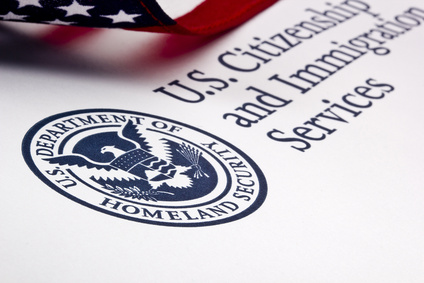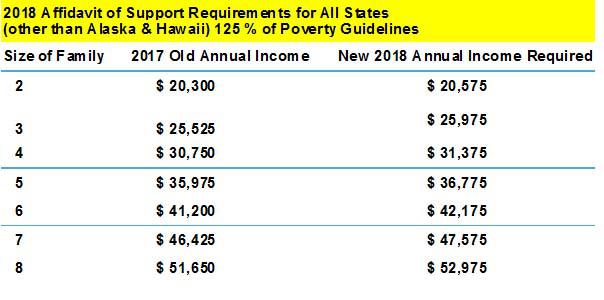POSTING DATE: March 26, 2018
Learn More About:
Immigration News & Updates eNewsletter © 2011 - 2018
For questions about U.S. Residency, Green Cards and Immigration Visas, Visit our Website at: www.ImmigrateToday.com or call our office at: (954) 382-5378
Check Out This Cool Stuff For Immigrants....
Immigration
Questions & Answers
This Week's Immigration News
Question: I have been in America for 4 years along with my 11 year old daughter. We came for a visit to see my sister who had a heart attack and then I stayed to take care of her after that. She died a year later. By that time, my daughter was in school and it was difficult to leave. I have been dating my boyfriend who has a green card for a year now and we are talking about getting married. My question is once we get married, can we file immigration papers for me and my daughter? Will we be legal after that? When will I get my drivers license, work permit and social security number? Thank you for your answers.
Answer: Great question, spouses and minor children of U.S. Residents (Green Card holders) who are inside the U.S. with expired immigration status are generally not eligible to obtain Residency. This means that the I-130 family petition filed by the U.S. Resident spouse does not confer any legal status or immigration benefits on the foreign national spouse or children. No legal immigration status, no social security card or driver’s license. If the foreign national spouse files a petition to adjust status to Residency, the case will be denied and under Trump administration policies, this could lead to deportation.
This is in stark contrast to the generous rights and benefits available to the foreign spouse and children of U.S. Citizens. Under immigration regulations, as long as a spouse or child entered the U.S. legally, even if they then later fell out to status, they remain eligible to apply for Residency, remain in the U.S. during the immigration process and receive a work permit, social security card and later driver’s license.
The only option for the foreign spouse and children of a Resident is to wait until the U.S. Resident becomes a U.S. Citizen. Once he or she naturalizes and the Residency case is filed, and the spouse and children may legally remain in the U.S. during the entire immigration process. So the priority is always - how quickly the U.S. Resident spouse can file for and obtain U.S. Citizenship, I hope this is helpful to you.
No DACA Protection Included In This Year’s 2018 Budget Bill
Last week both houses of Congress passed the yearly budget bill, which funds the government through September 2018. Trump signed the bill on Friday. Many were hopeful that a DACA protection extending the program or making it permanent would be included in the bill, but in the end, negotiations between the Democrats and Republicans failed.
The DACA deal fell through in part because Democrats insisted on a permanent solution for Dreamers, which includes a pathway to citizenship. For now, pursuant to Federal court rulings, the Trump administration is forced to keep the DACA program open for renewals, but the program is not available for first time applicants.
Immigration How To:
How Do I Know If My Criminal Record Will Be a Problem For Me At The U.S. Border?
Helpful Immigration Tips You Can Use...
Immigration News & Updates eNewsletter
eNewsletter
The Growing Risk Of Extending Or Changing Status Inside The U.S.
Commonly, in the past, a foreign national visiting the U.S. on a Tourist/Business Visa, called a B1/B2, could extend his or her stay or change to a new visa like an F-1 Student visa status, by filing an application with the USCIS. Once filed, the applicant could remain in the U.S. legally, while waiting for the application to be processed, typically within several months.
An example would be a case involving an international tourist wishing to extend his or her vacation for several months in the U.S. or an individual seeking to become an international student to study English or enroll in an academic program.
USCIS Suspends Premium Processing For All New H1B Cap Petitions
H-1B visa applications from U.S. employers are accepted every year during the first week in April. These visas are for foreign workers in “specialty occupations” which the USCIS and department of labor have determined require at least a Bachelor’s degree to perform. Due to the limited number of visas and overwhelming demand, the USCIS performs a random lottery to choose 65,000 of the expected 300,000+ applications received. Just as last year, the USCIS has announced that it will suspend premium 15-day processing services for all H1B Cap applications.
Question: My wife and 2 daughters and I are here visiting Florida on vacation from Colombia and we have been here for 5 months. When we entered the border at the airport, the officer gave us 6 months to stay. We plan to leave, but decided since we are here, we want to extend our trip a few months and plan to head west and go to the grand canyon and over to Utah to the national parks there and maybe even to California to see Yosemite. We think if we can get an extension for 2 more months, that will give us time to complete our vacation and return home. My question is whether we can file a request to be granted 2 more months to stay in the U.S. , so 8 months, instead of 6? I have to be back at work in early July, so that is all the time we can stay. If so, what is the form we need to use and how does the process go?
Answer: The law allows most foreign visitors in the U.S. who enter on tourist visas to file a request to extend their status in the U.S. in order to remain here legally for legitimate purposes. Extending your stay for additional time to travel and tour the U.S. is a valid purpose. If approved, the USCIS will automatically approve up to six more months to stay in the U.S.. The problem is that the processing time for extending your status can take 4+ months or more.
That means that if you file the request now, a decision on your extension request may not be made until July, after you are scheduled to leave. As such, once you file the request, if your period of stay expires while the USCIS is processing your application and you leave before the case is approved, your U.S. B1/B2 visa for you and your family will automatically be cancelled. Even if the application is approved after you leave the U.S., the request is only valid for extension of stay while you were in the U.S., effectively forcing you to remain in the U.S. once you file the request, to avoid losing your U.S. tourist visa. There is no logic in this process, it is simply a ridiculous process which has gotten out of hand. So in your circumstances, it would be risky for you to file the request to extend status, since your period of stay expires next month in April. Its best for you to return home, then schedule a new trip later in the year.
Democrats continue to work on a bipartisan bill with moderate Republicans to fix the DACA issue, but so far there is no time-frame for a vote. Stay tuned…
However, things have gotten much more complicated recently, and due largely to new Trump administration policies, very risky for anyone who wants to change or extend status in the U.S.. There are several reasons, first, under a recent Trump policy change, foreign nationals should wait for 90 days after the date they entered the U.S. before filing any immigration application with the USCIS, including those to extend or change status. Second, the USCIS processing time has increased so drastically, to 4-9 months, that in most instances, an individual’s “period of authorized stay” in the U.S. will expire while waiting for their application to be processed. Third, as part of Trumps new tough immigration measures, it is more difficult to obtain approvals and foreign applicants must now withstand more scrutiny about their intentions to return to their home country, and risk denial if they are not able to provide documentation which establishes that they own property and continue to maintain a residence in their home country, to which they intend to return once their visa in the U.S. expires. Finally, under another new policy, all applicants to change status to an F-1 student or other visa in the U.S. are first required to file applications to extend status in the U.S.. This is not only confusing, but can lead foreign nationals to believe that once they file the application to extend status, it will automatically be granted and there is no risk, when nothing could be farther from the truth.
Taken together, this is a lethal combination for any foreign national who values their U.S. visa, since overstaying an individual’s “period of authorized stay” in the U.S. by even one day, results in immediate cancellation of that person’s B1/B2 visa. And under the present circumstances, it is very easy to overstay, since USCIS processing takes so long and denials are much more common. Another risk that many applicants do not understand is that if they apply to extend status in the U.S. and are approved, once they leave and later try to return again too early, they risk heightened scrutiny about their intentions in the U.S. and in some cases denial of entry or even B1/B2 visa cancellation if the officer believes they are seeking to reenter the U.S. with the intention to change or extend status again. Finally, if an individual applies to extend or change status in the U.S., then leaves the U.S. after his or her “period of authorized stay” in the U.S. has expired, before the USCIS has issued a decision on their case, again, it results in immediate cancellation of that person’s B1/B2 visa. Clearly, filing any application to extend or change status in the U.S. is risky and should be very carefully considered before an application is made. In most cases, applying for an F-1 student visa is much safer to do abroad through the U.S. Consulate and much quicker, usually within about 30-90 days.
Any request for premium processing (form I-907) filed with a cap-subject H1B petition will be rejected. If only one check is submitted with the H1B petition, combining the regular H-1B and premium processing fees, the entire petition will be rejected and returned to the petitioner.
Learn more about H-1B work visas
New 2018 Poverty Guidelines Released for Affidavit of Support (Form I-864)
The new minimum income requirements under the I-864 Affidavit of Support have been released. Beginning in March 2018, U.S. Citizen and U.S. Resident Sponsors are required to meet or exceed 125% of the Poverty Guidelines in order to qualify. The income requirements for 2018 have increased just slightly from 2017.
You can get a link to take a look at the new 2018 Poverty Guidelines for Affidavit of Support for Immigration.
Here’s a few important tips for Sponsors to remember when filing an Affidavit of Support (form I-864) for loved ones:
Always include a copy of:
a) your most recent tax return and W-2
b) past 3 months paystubs and
c) current letter from your employer stating your fulltime position, dates of employment and wages (which match your paystubs).
Importantly, self-employed income can often be problematic, since after deducting expenses, the net income is often far below the guidelines. Note that even if the sponsor does not meet the requirements, and uses the income of a Joint Sponsor, he or she must still file an I-864 and include evidence of income.
When submitting an I-864 from a Joint-sponsor who does meet the minimum income qualifications, be sure to include:
a) copy of the Joint-sponsor’s U.S. Birth Certificate, U.S. Passport, Naturalization Certificate or Green Card
b) copy of the most recent tax return and W-2
c) past 3 months paystubs and d) current letter from his or her employer stating fulltime position, dates of employment and wages (which match his or her paystubs).
Importantly, most U.S. Citizen parents sponsoring biological minor children under age 18 are not required to file an Affidavit of Support, since the immigrating child will automatically become a U.S. Citizen upon obtaining U.S. Residency. Instead, form I-864W is required requesting the exemption.
You can get free information about preparing I-864 Affidavits of Support, meeting the minimum income requirements
or requesting an exemption by calling our office at: 954-382-5378.
For example, the minimum yearly income of $ 20,575 is now required to sponsor a Spouse, compared with $20,300 for 2017. The new guidelines are posted on the USCIS forms webpage as form I-864p
Tips For Green Card Holders With Criminal Records: Think Twice Before Travelling Outside U.S.!
With the Trump Administration cracking down on both legal and illegal immigration, it would be wise for U.S. Residents (Green Cards holders) with criminal records to take great care before travelling abroad, since even old criminal convictions can cause difficulties in re-entering the U.S., result in a bar to readmission and in some cases, even removal from the U.S..
Under the Department of Homeland Security’s new enforcement priorities announced in February, the government’s application of strict Immigration enforcement laws are tightening, resulting in raids and the apprehension of Immigrants with even “suspected” criminal activity. This of course also means more scrutiny of both foreign visitors and U.S. Residents seeking to enter the U.S. from abroad as well.
This is particularly a concern for U.S. Residents with certain criminal convictions who travel abroad, even for brief periods, since they will now be more fully vetted upon returning to the U.S.. Many Residents are unaware of the immigration implications of old, seemingly insignificant criminal convictions. Under the regulations, many crimes are considered Crimes of Moral Turpitude, which fall into three categories:
1) those involving fraud, larceny (i.e. theft),
2) crimes against persons or 'things', and
3) governmental authorities.
Alone, many crimes do not have negative consequences for Residents, however, if a person has two or more such offences, no matter how old, depending upon the circumstances, they run the risk of being inadmissible to the U.S. or of being deportable. And while waivers are available in some cases, there is never a guarantee of approval and new border policies may require such individuals to remain in detention until the case is resolved. Note that many crimes committed by juveniles before age 18, may be excused, and under some circumstances, a pardon will be recognized, but for immigration purposes, expunged criminal convictions remain convictions and may still have consequences.
Therefore, the best advice for Residents with a criminal background who wish to travel, is to have their particular circumstances reviewed by a criminal immigration attorney first, before making any plans to travel abroad. Better to be safe, then sorry….













